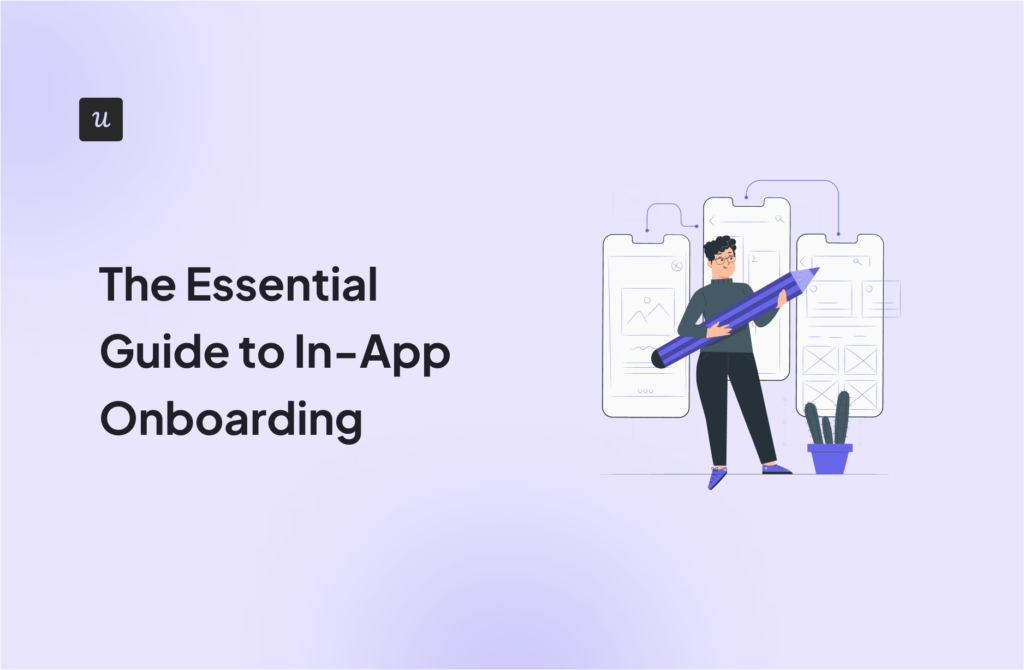
Top 10 Appcues Alternatives and Competitors Worth Exploring17 min read
Are you looking for a user onboarding software that offers everything Appcues does but comes without its drawbacks, such as complex pricing and limited analytics? Then you are in the right place, as we tested several Appcues alternatives and are ready to share our insights!
Get The Insights!
The fastest way to learn about Product Growth, Management & Trends.
What is Appcues?
Appcues is one of the first digital adoption platforms to hit the market. It offers several useful features, including multiple UI patterns for creating onboarding flows, flow analytics, and NPS surveys.
The platform works for both mobile and web apps and offers an extensive suite of third-party integrations.

4 reasons to consider Appcues alternatives
Here are some Appcues drawbacks that may make you reconsider investing in it:
1. Appcues lacks robust product analytics capabilities
Appcues markets itself as a user onboarding tool rather than an all-in-one product adoption platform, so it’s not surprising the analytics features aren’t that great.
While you can analyze the engagement of your Appcues-produced flows with basic dashboards, you can’t get deeper insights into the overall product performance. For example, you can’t create data visualizations such as conversion funnels or retention analysis to identify trends and friction points in the user journey.
To get the full picture, you’ll need to connect Appcues to an advanced analytics tool like Amplitude or Heap, but that’ll add to your costs.
2. Appcues doesn’t support bespoke user feedback surveys
Besides NPS surveys, you don’t get too many ready-to-use survey templates such as CES, PMF, or CSAT.
There are only a couple of basic forms that can only reach users if you embed them into flows. This means you can’t trigger contextual surveys across all relevant journey touchpoints (e.g. can’t trigger a satisfaction survey after customer service interactions).
Survey analytics capabilities for quantitative data analysis are limited, too. You can see the final NPS score but you can’t segment users based on responses to deliver targeted experiences.
3. Appcues customization options are limited
While Appcues lets you customize its pre-designed templates, you’re limited to some basic options like font style, size, color, and padding. Advanced customization requires working with CSS code, which can be challenging for non-technical teams and restricts its usage.
Additionally, Appcues doesn’t offer the if/then branching option for its flows, making them very linear and rigid.
4. Appcues can get too expensive
With its Growth plan starting at $1000 per month, Appcues is already on the higher side.
Its pricing structure isn’t very flexible either. As your monthly active users increase, so will the price, unlike other platforms where the pricing is based on features.
Not to mention that some essential features such as integrations and localization aren’t included in any of the plans and are only available as add-ons at an additional cost.
Finally, the lack of analytics and feedback collection features means you have to also invest in additional tools specialized for these use cases, further adding to your overall costs.
Top 10 Appcues alternatives and competitors
These tools all offer a range of user onboarding elements, and UI customization and are designed to help improve your product experience.
Appcues alternative #1: Userpilot
Userpilot is an all-in-one product growth platform that offers robust user engagement, feedback, and product analytics capabilities.
Whether you want to nudge users to key activation events or dig deeper into user sessions, Userpilot comes in handy.

Userpilot is a great Appcues alternative. It comes with a variety of unique features such as:
- Event auto-capture – Once you set up Userpilot, the platform automatically records events like clicks, hovers, and text inputs, eliminating the need to manually tag each.

- Analytics reports – Unlike Appcues, Userpilot offers detailed analytics reports like funnel analysis, trend analysis, and retention tables. These reports paint a complete picture of how users interact with your product, help you identify friction points, and optimize the user journey.
- Robust resource center – You can create comprehensive resource centers with multiple formats inside and advanced customization. Moreover, you can embed and play videos right from within the resource center, without leaving the app. Meanwhile, Appcues Launchpads (a substitute for the resource center) is limited to flows and links.

- Survey features – Userpilot provides 15+ survey templates, branching logic, and contextual triggering—none of which is available on Appcues. Also, Userpilot allows you to tag and analyze open-ended NPS responses. This makes it easier to identify trends among detractors and promoters and prioritize product improvements.
- Driven actions – Driven actions enable you to create cross-URL user experiences. That means that you can lead your users through different pages of your application and show them different in-app experiences. It makes your customer onboarding more interactive.
- Rule-based flow triggering – Userpilot offers if/then logic for flows, which means the steps in flows progress depending on user actions.
- Ease-of-use – Userpilot’s interface is very intuitive and quick to set up and use even for most non-technical team members.
I know it sounds like a not-so-humble brag, but we have thousands of satisfied customers who can back up our words:

Does Userpilot have any limitations, you may ask? The answer is yes. Unlike Appcues, Userpilot doesn’t work for mobile apps. Although this is something we are actively working on!
So, to sum this all up, here is an overview of these two tools:

Userpilot pricing
Userpilot offers a 14-day free trial to let users explore the platform’s features. Paid plans include:
- Starter – Starting at $249 per month (billed annually), it allows up to 2000 monthly active users. The plan includes in-app user engagement, segmentation, NPS surveys, and basic analytics.
- Growth – Pricing starts at $799 per month (billed annually) and includes in-depth analytics, event auto-capture, survey templates, content localization, and more.
- Enterprise – You get premium third-party integrations, priority support, custom contracts, and advanced security. Pricing is available on request.
Appcues alternative #2: Pendo
Pendo is a popular full-stack product experience platform. Initially launched as an analytics tool for product teams, the company later introduced Pendo Guides, an in-app content editor designed to create user guidance directly within the same platform.

Since Pendo started off as a dedicated analytics platform, its robust capabilities in this domain aren’t surprising.
Pendo’s Paths feature helps visualize user navigation through different pages, sortable by date, segment, or visitor ID. Meanwhile, the retention report showcases cohort retention over time and the funnel analysis report displays metrics such as unique visitor counts and completion rates.

In addition to its comprehensive visualizations, you can leverage session replays to see the specific actions users take on a page.
When it comes to UI patterns, Pendo falls behind Appcues a bit. First, because it lacks slideouts. Another major drawback is that you can’t build standalone onboarding checklists in Pendo, they are only available through the onboarding module of the Resource Center.
One way Pendo sets itself apart from other tools in the digital adoption scene is through its product planning features. First, Pendo Validate empowers teams to test and prioritize ideas by launching them to different groups of users and gathering votes.
Then, Pendo Roadmaps allows product teams to visualize ideas, share updates, and align internal stakeholders on the strategy. You can link features to user feedback, share updates with precision, and adjust in real time as new insights flow in.

Pendo pricing
Pendo offers a free plan that includes retroactive product analytics, in-app guides, NPS surveys, and roadmaps. It offers four paid plans: Base, Core, Pulse, and Ultimate. The pricing isn’t transparent, and you’d have to request it by getting in touch with their team.
However, according to Vendr, a SaaS negotiating company, costs for Pendo can range from $25,800 to $132,400.
In other words, it’s very expensive. You can save 40% by switching to Userpilot – we offer all the same features ( even more) at a lower price.
Appcues alternative #3: UserGuiding
UserGuiding is a relatively new user onboarding software, best known as a budget-friendly solution for small startups.

For its price of $199/month, Userguding offers solid onboarding features such as checklists, modals, banners, tooltips, in-app surveys, and even a resource center, which even much more expensive Appcues doesn’t offer!
However, even though it offers a bit of everything, the quality may not be the greatest. For one, customization options are way more limited than you get with Appcues, and you only get access to 8 tool integrations.
In other words, Userguiding is a good starting point for businesses with basic onboarding needs, but it’s not scalable and nowhere near the capabilities renowned platforms like Appcues or Uerpilot have.
UserGuiding pricing
With UserGuiding, you get a 14-day free trial to test the platform’s features and functionalities. Pricing for paid plans is based on the number of monthly active users. They come in three tiers: Basic ($69/month), Professional ($199/month), and Corporate (custom).
Appcues alternative #4: Intercom
Intercom is primarily recognized as being one of the most popular customer messaging platforms. However, a few years back Intercom launched its “Product Tours” feature, which is offered as an add-on to its main platform.

Intercom allows you to seamlessly integrate tours into your messaging sequences and guide users to the right tour directly from a 1:1 live chat.
Sounds impressive, right? But here’s the catch: as it isn’t Intercom’s main focus, Product Tours is missing several key UI elements such as slideouts and hotspots. Additionally, there is no conditional triggering.
These limitations make it clear that Intercom, at its core, is a customer service platform that tries to do it all, but at the expense of delivering deep, specialized solutions.
If, on the other hand, you’re equally interested in Intercom’s messaging widget, then Product Tours is a great choice. Or if you’re already using Intercom’s messaging, then it’s really simple to add Product Tours.
Intercom pricing
Intercom has paid plans that follow user-based billing. All its pricing plans come with a free trial, and the pricing starts at $29/month per user. To access the Proactive Support add-on (which hosts Product Tours), you need to pay an additional $99/month.
Appcues competitor #5: Chameleon
Chameleon is another user onboarding platform similar to Appcues and mostly offers the same features as the latter. Except, unlike Appcues, it offers some basic features for employee onboarding too.

Similar to Appcues Launchers, Chameleon offers Launchpads for self-service – in-app widgets that can open checklists, small help widgets, or notification centers. The downside is that you can’t have one launcher with multiple types of content.
You also get real-time analytics—a feature, not many Appcues alternatives offer.
Finally, Chameleon prides itself on being very customizable. Indeed, its checklist customization options are way more flexible than Appcues, allowing you to create completely on-brand elements. However, this comes at a cost – the interface isn’t intuitive and many users complain that it’s a pain to use.
Chameleon pricing
Chameleon’s pricing is based on the number of monthly tracked users (MTUs). The basic Startup plan’s pricing begins from $279 per month and is the only plan that offers a free trial.
Additionally, Chameleon lets users add the HelpBar to their products for free, regardless of whether they sign up for a paid plan.
Appcues competitor #6: WalkMe
WalkMe was primarily designed for onboarding and training employees on internal third-party tools like HubSpot and Salesforce. It works on desktop, mobile, and web apps. Since its launch, WalkMe has evolved and now offers some basic customer onboarding capabilities, too.

WalkMe brings workflow automation features for building automated workflows and streamlining routine processes.
You also get employee-specific features in the form of a Workstation hub, which provides employees with all the guidance necessary to learn about a product.
WalkMe’s onboarding flows are supported by its rule-based automation, allowing businesses to design if/then logic that adapts to different user behaviors and paths.
WalkMe pricing
WalkMe offers custom pricing for both customer and employee experience. It’s worth mentioning here that the platform’s pricing is based on potential usage. You must have a clear idea of your future needs before signing the contract.
Also, several key features, such as enterprise analytics, customization, and collaboration, aren’t included in pricing. You’ll have to purchase these add-ons individually, and the final cost could exceed your budget.
Appcues alternative #7: Whatfix
Whatfix is a digital adoption platform similar to WalkMe but compared to it has a more modern feel.

One of the standout features of Whatfix is that it can be used on desktop, mobile, and web apps.
Along with basic in-app guidance features like onboarding checklists, tooltips, and pop-ups, you also get branching in workflows.
Besides tracking engagement of no-code in-app guidance flows, Whatfix also lets you set up custom events and dig deeper into user journeys.
You also get robust reporting capabilities, including cohort analysis and trend analysis. The platform even uses AI algorithms to generate actionable insights from product usage data.
Whatfix pricing
Whatfix offers different pricing for its Digital Adoption Platform and Product Analytics features. In either case, you can choose from 3 plans and request a quote. Pricing information isn’t available on the website.
Also, keep in mind that for mobile applications, the Digital Adoption Platform comes with only one paid plan. For Product Analytics, you still get to choose from 3 tiers. Like most product growth tools, Whatfix comes with a free trial, too.
Appcues alternative #8: UserIQ
UserIQ describes itself as a customer success platform rather than a product adoption one yet it still has functionalities for improving user onboarding experiences.

One standout feature of UserIQ is its customer health dashboard, which provides a comprehensive view of customer health scores and identifies potential churn risks.
You can also launch VoC engagements, including NPS surveys, microsurveys, custom surveys, and ratings, to collect feedback from users. Those surveys are much more customizable and advanced than the ones offered by Appcues.
UserIQ pricing
UserIQ’s pricing isn’t available to the public. Also, there’s no information about whether the platform offers a free plan or trial.
Appcues alternative #9: Scribe
Unlike Appcues and its alternatives listed so far, Scribe isn’t a full-scale digital adoption or user onboarding platform. Instead, it’s an AI-powered tool that lets you create step-by-step guides for any process, including user training.

Using Scribe is pretty straightforward – it records your screen while performing a task, and then it automatically identifies and lays down key steps, along with annotated screenshots, instructions, and click marks.
While you can use Scribe to create tutorials for different product features, they may not be as contextual as onboarding flows created with Appcues since it doesn’t offer in-app UI patterns. Instead, you can add alerts, tips, and GIFs to your guides to make them more engaging.
You can track guide engagement with metrics like completion rate, number of views, and individual viewer insights.
Scribe also lets users provide feedback in the form of comments. This way, you’ll know if your guides are outdated or confusing and need changing.
Scribe pricing
With Scribe, you get a forever-free plan (Basic) that includes auto-capture and basic customization and analytics. It works for web apps only. If you want to use Scribe for desktop and mobile apps, too, you need to choose one of the paid plans that start at $12/month per seat.
Appcues alternative #10: Shepherd.js
Shepherd.js is an open-source JavaScript library that can be used to code custom onboarding tours.

It’s worth noting that with Shepherd.js, you don’t get no-code capabilities. While the open-source library minimizes the extent of coding, you still need some technical knowledge to design onboarding experiences.
And while Appcues does require some CSS knowledge, it’s still simpler when compared to Shepherd.js.
Shepherd.js pricing
Shepherd.js is an open-source library and is, therefore, available for free.
Conclusion
If you’re in the market for Appcues alternatives, you’ll be spoilt for choice. While some platforms offer more variety in terms of surveys, others bring sophisticated analytics to the table. Then, there are platforms with basic features that offer excellent value for money.
It’s up to you to understand your business goals and choose an Appcues alternative that meets them.
Userpilot offers all the features you’d expect from a standard product growth platform and even more. Schedule a Userpilot demo to understand whether it’s the right fit for your product.







